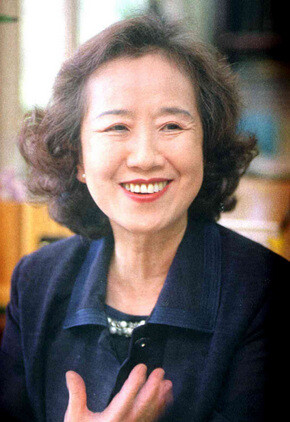hankyoreh
Links to other country sites 다른 나라 사이트 링크
History textbook controversy heats up

Controversy is expected to erupt as the National Institute of Korean History, which has been reviewing possible revisions to high school history textbooks, including one titled “A Modern and Contemporary History of Korea,” has submitted a report to the Ministry of Education in which it appears to justify the dictatorships of the authoritarian rulers of the past.
In a report titled “A Review of ‘A Modern and Contemporary History of Korea’ and Proposed Guidelines” submitted to the Ministry of Education, Science and Technology, the NIKH provided a set of guidelines for each chapter of the six volumes of the high school textbook by withholding its judgment on the 253 items contained in a request for revision by various conservative groups. The report was released by the education ministry on October 16. Of the proposals, the NIKH recommended that one chapter titled “Development of Contemporary Society” include language that says that the Republic of Korea put its focus on economic development and deterring communist threats by deferring democracy in the aftermath of the 1950-53 Korean War. The NIKH said the text should show a close correlation between democracy and economic development in the Republic of Korea.
In response, Ju Jin-oh, a history professor at Sangmyung University, said the proposal justifies the dictatorships of the authoritarian rulers of the past as an unavoidable consequence of the Korean War, the same claim made by the Korea Chamber of Commerce and Industry and the New Right group Textbook Forum. The situation has become more serious, Ju said.
Critics say the NIKH’s proposed guidelines contradict current educational curriculum guiding textbook writing and history education. The current curriculum says that after former President Syngman Rhee seized power, corruption deepened and there was a climate that allowed dictatorship to flourish, and it should be understood that the people’s support for the government collapsed.
The current curriculum says South Korea’s democracy faced its harshest ordeal after the government of former President Park Chung-hee established the Yushin (Revitalizing Reform) Constitution following his seizure of power. The NIKH suggests that it should be made clear that constitutional democracy was in limbo until the pro-democracy uprising of June 1987.
It was also discovered that the NIKH’s proposed guidelines were not endorsed by an eight-member committee selected by the Education Ministry to review and revise the history textbooks.
One committee member said that most of the other committee members did not agree with the NIKH’s proposed guidelines. The committee member said the committee did reach consensus on the idea that it was inappropriate for the NIKH to even have proposed guidelines because there is the curriculum already exists and said that the NIKH’s guidelines should be viewed as the stance of the NIKH and not historians.
The Education Ministry, however, says that it will proceed with revising the history textbooks, basing its revisions on the NIKH’s proposed guidelines.
Shim Eun-seok, the director of the ministry’s school policy bureau, said the ministry plans to map out a proposal for the revisions by the end of the month after inviting teachers, professors and other experts to review the revisions. Shim said that NIKH’s guidelines will serve as the basis for the revisions.
Please direct questions or comments to [englishhani@hani.co.kr]
Editorial・opinion
![[Column] Is Korean democracy really regressing? [Column] Is Korean democracy really regressing?](https://flexible.img.hani.co.kr/flexible/normal/500/300/imgdb/original/2024/0705/2917201664129137.jpg) [Column] Is Korean democracy really regressing?
[Column] Is Korean democracy really regressing?![[Column] How tragedy pervades weak links in Korean labor [Column] How tragedy pervades weak links in Korean labor](https://flexible.img.hani.co.kr/flexible/normal/500/300/imgdb/original/2024/0703/8717199957128458.jpg) [Column] How tragedy pervades weak links in Korean labor
[Column] How tragedy pervades weak links in Korean labor- [Column] How opposing war became a far-right policy
- [Editorial] Korea needs to adjust diplomatic course in preparation for a Trump comeback
- [Editorial] Silence won’t save Yoon
- [Column] The miscalculations that started the Korean War mustn’t be repeated
- [Correspondent’s column] China-Europe relations tested once more by EV war
- [Correspondent’s column] Who really created the new ‘axis of evil’?
- [Editorial] Exploiting foreign domestic workers won’t solve Korea’s birth rate problem
- [Column] Kim and Putin’s new world order
Most viewed articles
- 110 days of torture: Korean mental patient’s restraints only removed after death
- 2Months after outcry over “torture devices,” Justice Ministry proposes more restraints for immigratio
- 3Beleaguered economy could stymie Japan’s efforts to buoy the yen
- 4[Column] Is Korean democracy really regressing?
- 5Koreans are getting taller, but half of Korean men are now considered obese
- 6[Column] How tragedy pervades weak links in Korean labor
- 7Former bodyguard’s dark tale of marriage to Samsung royalty
- 8Real-life heroes of “A Taxi Driver” pass away without having reunited
- 9[Editorial] Exploiting foreign domestic workers won’t solve Korea’s birth rate problem
- 10Democrats ride wave of 1M signature petition for Yoon to be impeached